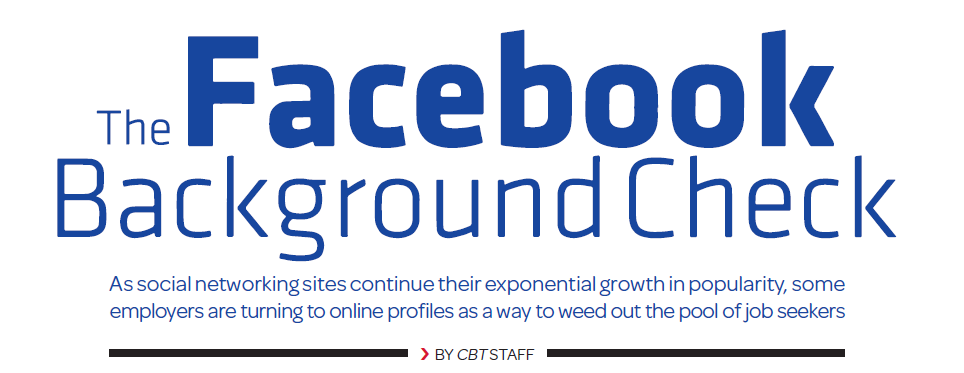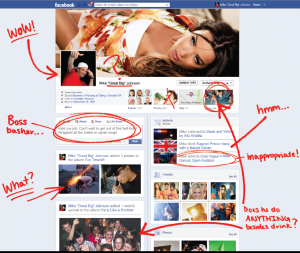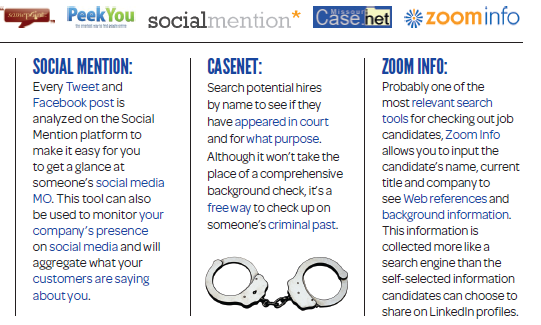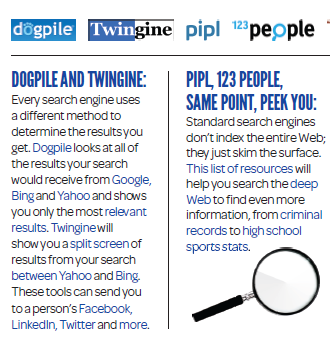The Facebook Background Check

THINK ABOUT THOSE JOB applicants you know will never fit in with your company: the negative Nancys, the over-the-top partiers, the Facebook boss bashers. Yet, they can easily type a resume and spruce up for a job interview. Then, maybe days or weeks later, you begin to see your newly hired employees’ true colors.

Social networking sites are swiftly becoming a popular decision-making tool among hiring managers to get a feel for this type of information. According to a 2011 survey by CareerBuilder, the largest job website in the United States, more than one-third of human resource managers use social media to research job candidates. Another 11 percent of HR managers plan to start soon. Facebook can expand your network of friends and just as easily narrow down a recession-riddled pool of applications, sometimes hundreds for just one job position.
Clues from an online presence
Bruce Barbour, vice president of operations at Midwest Computech, uses social networking sites for more than half of all job candidates. Not only does it help him formulate questions for the interview, but he says it also helps him “gain an idea of what the person is like that may not be answered in an interview.”
More often than not, companies venture on a Facebook hunt in hopes of finding bits of weed-out information only to find stellar references, additional work experience or a shining personality that wouldn’t fit on a one-page resume.

When Barbour checks out candidates’ social media presence, he says he’s mostly looking to see that the job history matches the resume and that there aren’t any huge red flags.
“To date, I haven’t found anything hurtful [for applicants],” Barbour says. “If anything, I’ve found good things said about them by others.”
Only 12 percent of respondents for the CareerBuilder survey said they were looking for reasons not to hire a candidate; they listed inappropriate photos, information about drug use, negative statements about previous employers, discriminatory comments and lies about qualifications as red flags.
Discrimination and applicant protection
Using social media to make hiring decisions can be a tricky practice, which is why 15 percent of companies have prohibited the practice. But for those who choose to use these capabilities, there are some things to know.

Although looking through social media sites is legal, asking candidates to supply the information for you to do so could be very problematic. Some companies have asked candidates to scroll through their Facebook pages during an interview, while others have asked outright for applicants’ passwords or forced them to friend a third party, such as an investigator or background-checking service.
Some states have outlawed those practices (Missouri is not among them) after Maryland set the precedent last May. Using social media in that way is a potential hazard for employers. Typically, employers can’t ask for marital or pregnancy status, race, religion, sexual orientation or age to protect applicants from discrimination. And that is the case under Missouri law. Discovering this information after requesting candidates supply access to their online presence can open up the possibility of discrimination claims by applicants who aren’t hired.
Fortunately for employers, you don’t have to choose between being stuck with a lawsuit and being stuck with a lemon.
The best way to both use the practice and protect your company from potential problems is to have a social media contract that allows someone who does not make the hiring decisions to look at applicants’ profiles. This way, relevant information can be passed onto the hiring manager, but protected information can remain just that: protected.


